ECOSF hosted the International Conference on Science, Technology & Innovation (STI): Catalysts for Regional Connectivity and Sustainable Development in the ECO Region (ECONEX) 2025
ECO Science Foundation (ECOSF) hosted the International Conference on Science, Technology & Innovation (STI): Catalysts for Regional Connectivity and Sustainable Development in the ECO Region (ECONEX) 2025 on April 17-18, 2025, in Islamabad, Pakistan, alongside co-organizers such as the Higher Education Commission (HEC) and the Economic Cooperation Organization (ECO) and many other esteemed partners. The conference aimed to leverage Science, Technology, and Innovation (STI) for sustainable development and regional connectivity in the ECO region. With 30 international delegates from countries including Türkiye, Iran, and China, and over 250 local participants, the event highlighted the transformative role of STI in addressing challenges like climate change, energy security, and economic disparities.
Organizer: ECO Science Foundation (ECOSF), Pakistan
Co-organizers: Higher Education Commission (HEC), Economic Cooperation Organization (ECO), Iran
Partners: CAREC Institute (China), ECO Educational Institute (Türkiye), National Energy Efficiency and Conservation Authority (NEECA) Pakistan, International Water Management Institute (Pakistan), Islamic Relief Pakistan, Health Services Academy, COMSTECH, Pakistan Science Foundation, Organization for Development of International Science and Technology Collaboration (ODISTC), Iran
To view the complete conference report click here
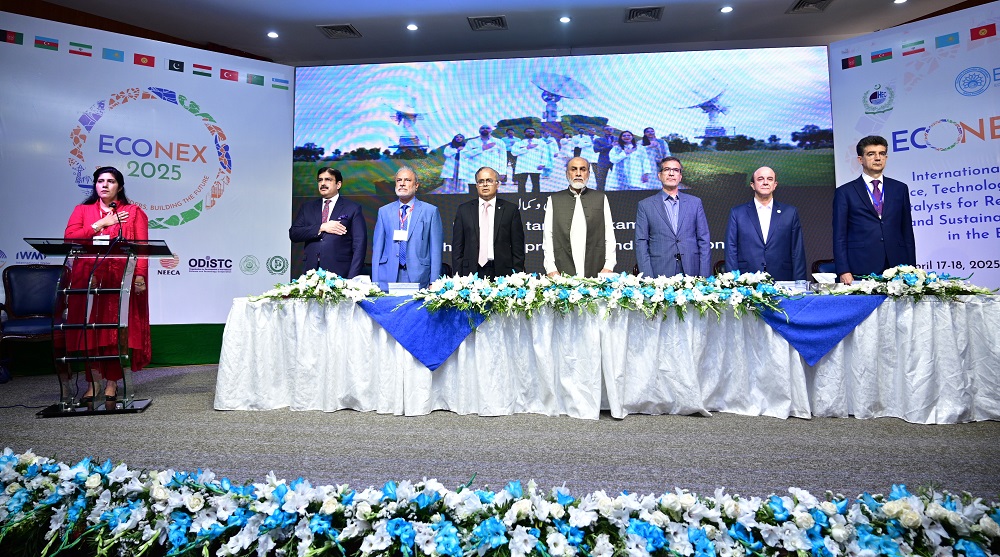
Inaugural Speakers
- Chief Guest: H.E. Mr. Khalid Hussain Magsi, Federal Minister for Science and Technology, Pakistan
- Guest of Honor: H.E. Dr. Asad Majeed Khan, Secretary General, Economic Cooperation Organization (ECO), Iran
- Guest of Honor: Prof. Abolfazl Vahedi, Vice Minister for Education, Ministry of Science, Research and Technology, Iran
- Co-organizer Representative: Prof. Dr. Zia ul-Qayyum, Executive Director, Higher Education Commission (HEC), Pakistan
- Speaker: Prof. Mehmet Akif Kireçci, President, ECO Educational Institute, Ankara, Türkiye
- Host: Dr. Ghulam Muhammad Memon, Executive Director, ECO Science Foundation (ECOSF)
- Host: Prof. Seyed Komail Tayebi, President, ECO Science Foundation (ECOSF)

Summary of Speeches and Key Highlights
Ghulam Muhammad Memon, Executive Director, ECO Science Foundation (ECOSF)
- Ghulam Muhammad Memon warmly welcomed all participants, emphasizing the significance of ECONEX 2025 as a platform for regional collaboration through STI. He highlighted the ECO region’s potential, with its 500 million population and vast resources, but stressed the need for strengthened cooperation in science and technology to address challenges like climate change, food security, and healthcare.
- Dr. Memon underscored the importance of harmonizing policies, building capacities, and fostering innovation ecosystems to unlock the region’s potential, calling for concrete recommendations over the two-day event.

Seyed Komail Tayebi, President, ECO Science Foundation (ECOSF)
- Tayebi reiterated ECOSF’s commitment to placing STI at the core of sustainable development and regional integration. He outlined the conference’s six plenary sessions, covering topics like STI ecosystems, regional trade, human capital, healthcare innovation, energy sustainability, and groundwater management, noting their interconnectedness.
- He emphasized that STI is a necessity, not a luxury, for economic competitiveness and social equity, expressing confidence that ECONEX 2025 would be a milestone in building a resilient and connected ECO region through actionable outcomes and partnerships.

Mehmet Akif Kireçci, President, ECO Educational Institute, Ankara, Türkiye
- Kireçci highlighted education and science as foundational to the ECO region’s global competitiveness, stressing the need for collective action in a rapidly changing world. He noted the emergence of new jobs over the next decade, with the ECO Educational Institute actively preparing for these shifts.
- He called for unity among ECO nations, leveraging the region’s vibrant youth population to drive innovation and shape a prosperous future through collaborative efforts in science and education.

Abolfazl Vahedi, Vice Minister for Education, Ministry of Science, Research and Technology, Iran
- Vahedi expressed appreciation for the organizers and emphasized STI’s role as a connector for ECO Member Countries to address shared challenges. He highlighted Iran’s advancements in renewable energy, biotechnology, and AI, offering to share expertise with ECO partners.
- He advocated for empowering researchers, entrepreneurs, and youth through joint research and partnerships, affirming Iran’s commitment to open collaboration for peace and prosperity in the ECO region.
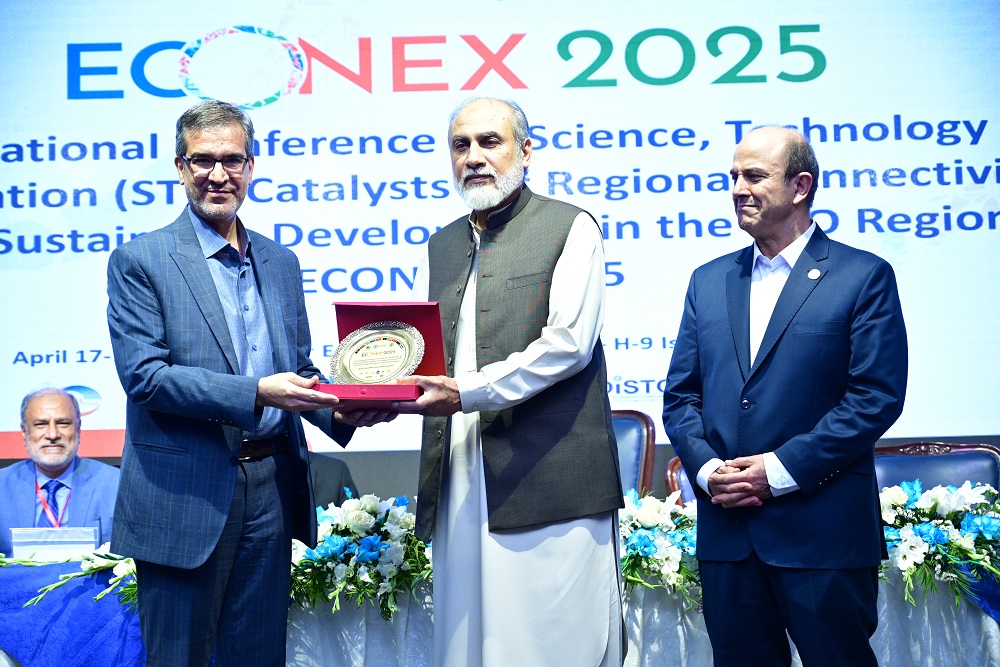
Dr. Zia-ul-Qayyum, Executive Director, Higher Education Commission, Pakistan
- Zia-ul-Qayyum likely underscored the HEC’s role in advancing STI education and research in Pakistan, aligning with ECONEX 2025’s goals. He may have highlighted initiatives like research funding and international partnerships to build human capital.
- He likely emphasized higher education’s role in equipping youth with STI skills to drive regional development, calling for collaborative educational frameworks across ECO countries.
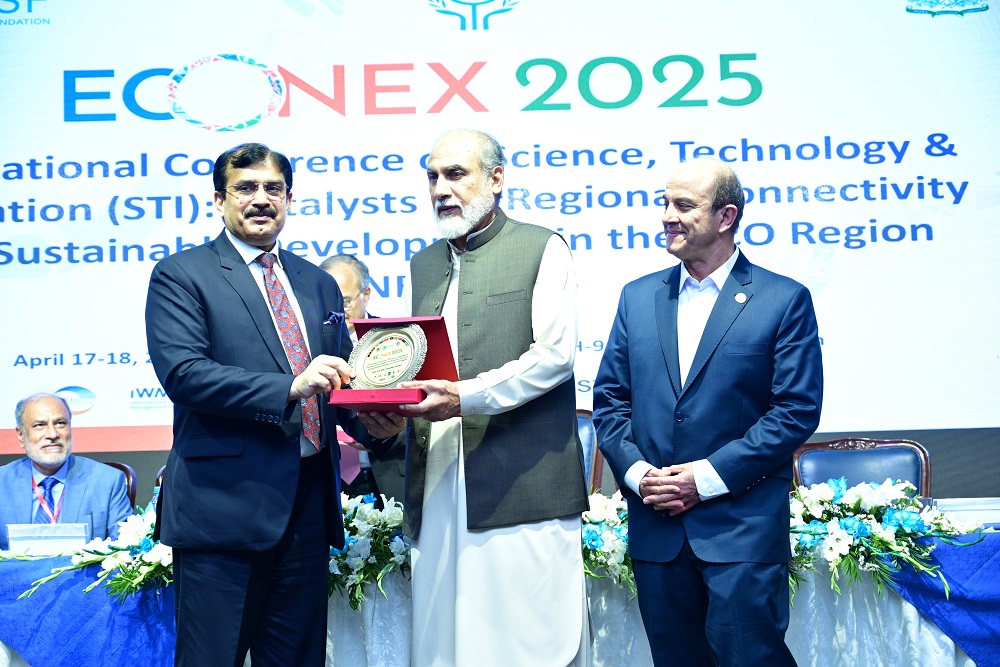
H.E. Dr. Asad Majeed Khan, Secretary General, Economic Cooperation Organization (ECO), Iran
- Khan reflected on the ECO region’s shared heritage, exemplified by historical ties like the Persian script in Lahore’s archives, and its natural fit within the Silk Road framework. He noted global challenges like the weaponization of financial systems, urging the region to leverage STI for resilience.
- Shared Heritage as a Foundation for Collaboration. Dr. Khan emphasized the ECO region’s deep historical, cultural, and linguistic ties, exemplified by the Persian script in Lahore’s archives and inscriptions at Masjid Wazir He highlighted how this interconnected past, rooted in the Silk Road framework, positions the region for unparalleled collaboration in the face of shifting global dynamics.
- Addressing Global Challenges through Regional Solidarity. He pointed out the pressing global challenges, such as the weaponization of financial systems, trade, and assistance mechanisms, which disproportionately affect developing nations. Dr. Khan urged ECO countries to turn inward, leveraging regional strengths to build solidarity and resilience against these external pressures.
- STI as a Catalyst for Transformation. Dr. Khan underscored the transformative potential of Science, Technology, and Innovation (STI) in fostering innovation, connectivity, and socio-economic growth. He stressed that investing in STI can yield multiplied benefits for developing nations, making it a key catalyst for the ECO region’s progress.
- Empowering Youth for a Vibrant Future. A central theme of his address was the need to focus on the region’s youth, whom he described as the vibrant future of the ECO region. Dr. Khan called for empowering them through education, research, and access to cutting-edge technologies to drive innovation and sustainable development.
- ECO’s Commitment to Regional Collaboration. As Secretary General, Dr. Khan reaffirmed the Economic Cooperation Organization’s unwavering commitment to supporting initiatives that deepen regional educational connections, enhance knowledge-sharing, and foster collaboration among member states. He envisioned a unified front that builds bridges for peace and prosperity through STI.
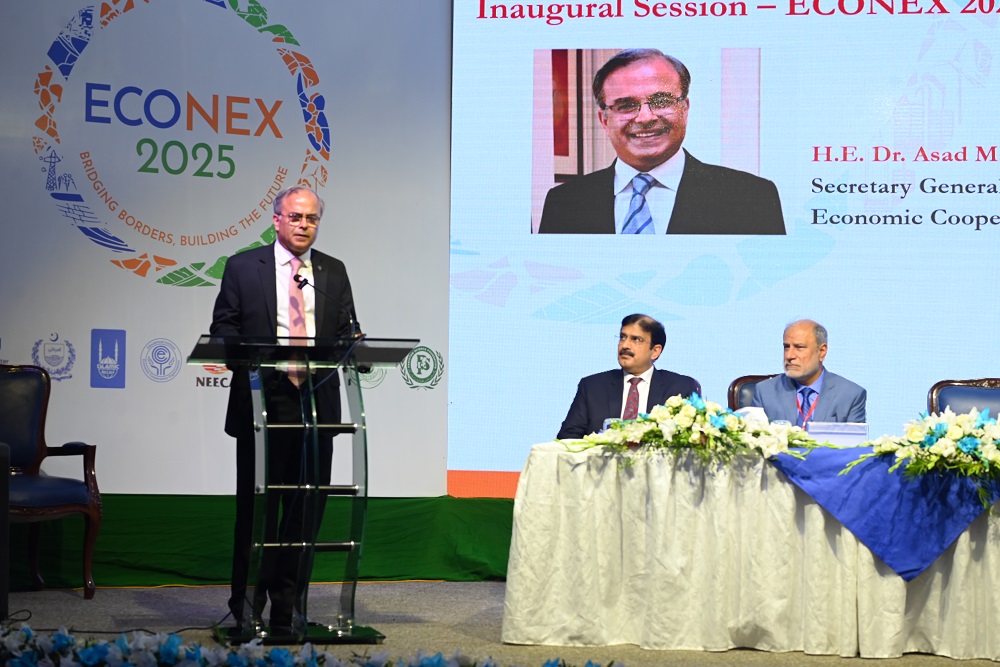
Address by H.E. Mr. Khalid Hussain Magsi, Federal Minister for Science and Technology, Pakistan (Chief Guest)
- E. Mr. Magsi welcomed international delegates and praised the ECO Science Foundation and HEC for organizing ECONEX 2025. He highlighted the conference’s focus on critical topics like energy, trade, and healthcare innovation, essential for socio-economic development in the ECO region.
- He emphasized the importance of developing robust STI systems to address local and regional challenges, wishing the conference success in fostering collaboration and innovation.
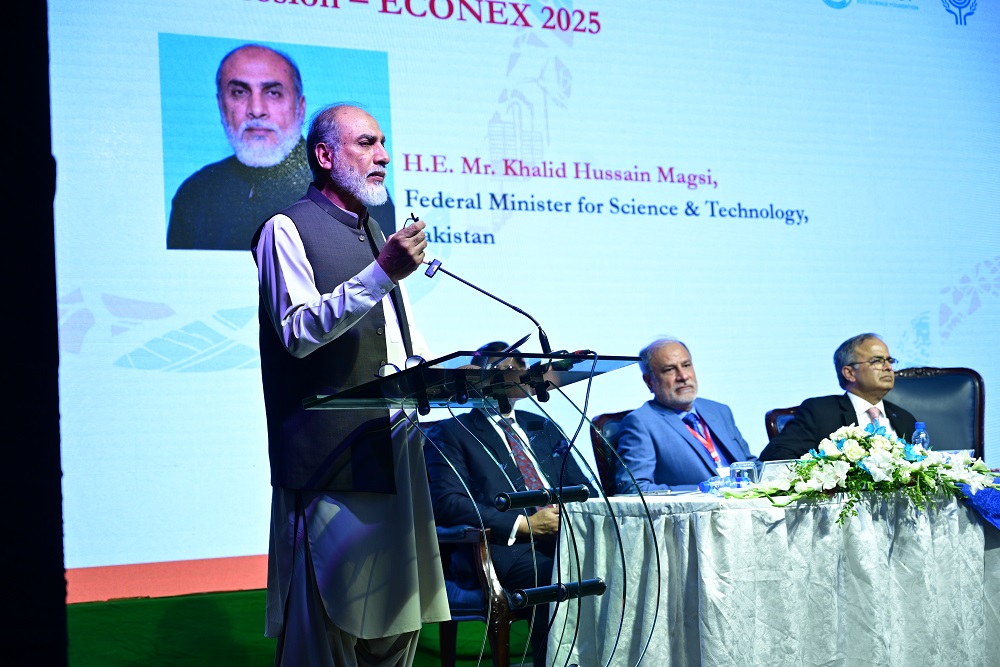
Key Outcomes and Takeaways
- The session underscored STI’s transformative potential in addressing regional challenges, with a strong emphasis on collaboration, knowledge-sharing, and capacity building among ECO member states.
- Speakers highlighted the ECO region’s vast potential, driven by its youth and resources, but stressed the need for unified efforts in education, research, and innovation to overcome disparities and global challenges.
- A recurring theme was the empowerment of youth through STI education, alongside the need for joint research, policy harmonization, and sustainable partnerships to ensure a resilient and prosperous ECO region.

